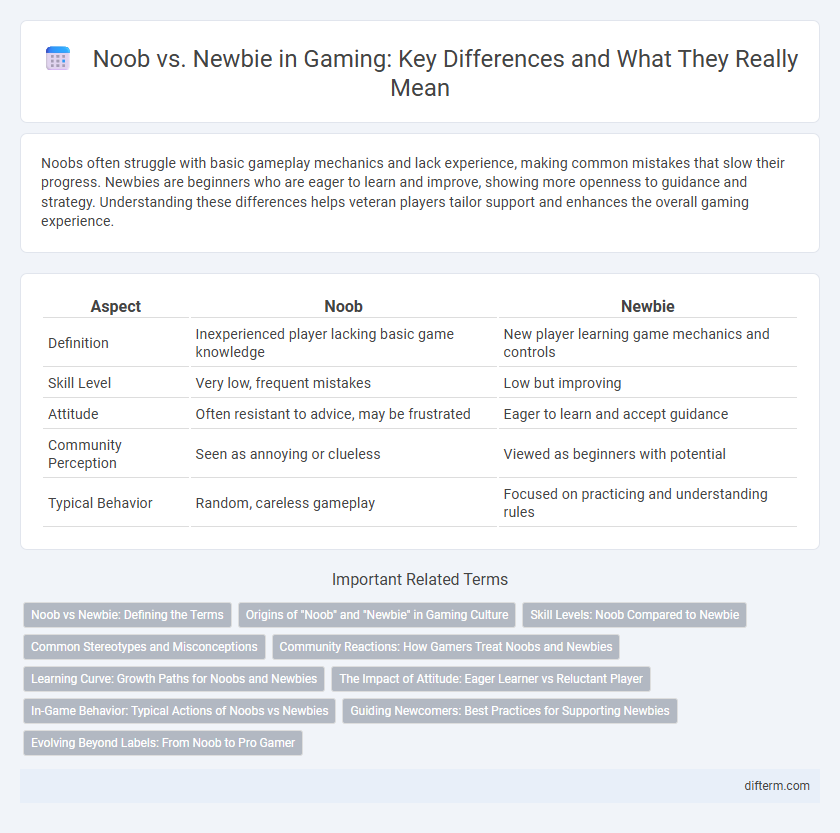Noobs often struggle with basic gameplay mechanics and lack experience, making common mistakes that slow their progress. Newbies are beginners who are eager to learn and improve, showing more openness to guidance and strategy. Understanding these differences helps veteran players tailor support and enhances the overall gaming experience.
Table of Comparison
| Aspect | Noob | Newbie |
|---|---|---|
| Definition | Inexperienced player lacking basic game knowledge | New player learning game mechanics and controls |
| Skill Level | Very low, frequent mistakes | Low but improving |
| Attitude | Often resistant to advice, may be frustrated | Eager to learn and accept guidance |
| Community Perception | Seen as annoying or clueless | Viewed as beginners with potential |
| Typical Behavior | Random, careless gameplay | Focused on practicing and understanding rules |
Noob vs Newbie: Defining the Terms
Noob and newbie are often used interchangeably in gaming, but they carry distinct connotations that define a player's experience level and skill. A newbie refers to a player who is new and learning the game, typically showing eagerness and potential for growth, while a noob implies a novice who lacks basic knowledge and often disregards community norms or strategies. Understanding the difference between noob and newbie helps foster a more supportive gaming environment by encouraging patience and mentorship toward new players.
Origins of "Noob" and "Newbie" in Gaming Culture
The terms "noob" and "newbie" both originate from early online gaming culture, with "newbie" emerging in the 1960s to describe newcomers unfamiliar with a community or skill. "Noob," a derivative of "newbie," gained popularity in the 1990s within multiplayer games like Quake and Counter-Strike, often used pejoratively to label inexperienced or unskilled players. While "newbie" remains a neutral term acknowledging inexperience, "noob" carries a stronger stigma, reflecting frustration or disdain from seasoned gamers.
Skill Levels: Noob Compared to Newbie
Noob and newbie both refer to inexperienced players, but noobs typically demonstrate lower skill levels and less understanding of game mechanics compared to newbies. Newbies are often beginners who are actively learning and improving their gameplay, showing a willingness to adapt and develop skills. The distinction impacts team dynamics and player interactions, as noobs often face stigma due to mistakes, while newbies are seen as increasing their competence over time.
Common Stereotypes and Misconceptions
Noobs are often stereotyped as completely unskilled and clueless, while newbies are seen as beginners who are eager to learn but still lack experience. A common misconception is that noobs are intentionally bad players, whereas newbies simply need time to develop their skills. Both terms highlight different stages of gaming proficiency but are frequently used interchangeably, causing confusion in gaming communities.
Community Reactions: How Gamers Treat Noobs and Newbies
Gamers often distinguish between noobs and newbies based on experience, with noobs perceived as clueless or disruptive while newbies are seen as beginners eager to learn. Community reactions vary, ranging from supportive mentoring and helpful guidance for newbies to frustration and criticism directed at noobs. Online gaming forums and multiplayer chats frequently reflect this divide, influencing how players are welcomed or ostracized within the gaming culture.
Learning Curve: Growth Paths for Noobs and Newbies
Noobs face a steep learning curve characterized by frequent mistakes and slow adaptation, requiring basic skill acquisition and game mechanic understanding. Newbies typically progress faster, building on initial knowledge with improved strategies and tactical awareness. Both growth paths emphasize incremental mastery through practice, feedback, and experience in diverse gaming scenarios.
The Impact of Attitude: Eager Learner vs Reluctant Player
An eager learner in gaming embraces challenges and actively seeks improvement, accelerating skill development and enriching the overall experience. In contrast, a reluctant player often struggles to progress due to resistance to change and a fixed mindset, limiting growth and engagement. Attitude significantly influences the trajectory from noob to experienced player, shaping both gameplay success and community integration.
In-Game Behavior: Typical Actions of Noobs vs Newbies
Noobs often exhibit erratic and uninformed gameplay, frequently making impulsive decisions and ignoring basic game mechanics, whereas newbies demonstrate a learning mindset by cautiously exploring game features and seeking tutorials. Noobs might flood chat with irrelevant or disruptive comments, while newbies tend to ask questions and engage positively with experienced players for guidance. In multiplayer settings, noobs may dominate team objectives with reckless actions, whereas newbies contribute more steadily as they build skills and understanding of game dynamics.
Guiding Newcomers: Best Practices for Supporting Newbies
Guiding newcomers in gaming requires clear, patient communication and step-by-step instructions tailored to newbie skill levels. Fostering a supportive community environment with accessible tutorials and mentorship programs helps new players build confidence and learn game mechanics effectively. Emphasizing positive reinforcement and avoiding jargon ensures beginners remain engaged and motivated to improve.
Evolving Beyond Labels: From Noob to Pro Gamer
Noobs and newbies often start with limited skills and knowledge, but evolving beyond these labels requires consistent practice, strategic learning, and adaptability in gaming environments. Pro gamers distinguish themselves by mastering mechanics, understanding game meta, and maintaining strong decision-making under pressure. Progression in gaming is defined by skill development rather than initial experience, emphasizing growth and perseverance over beginner tags.
noob vs newbie Infographic

 difterm.com
difterm.com